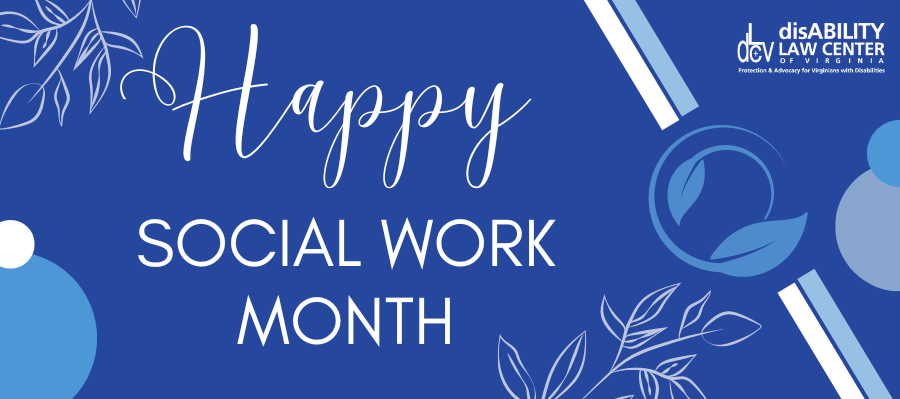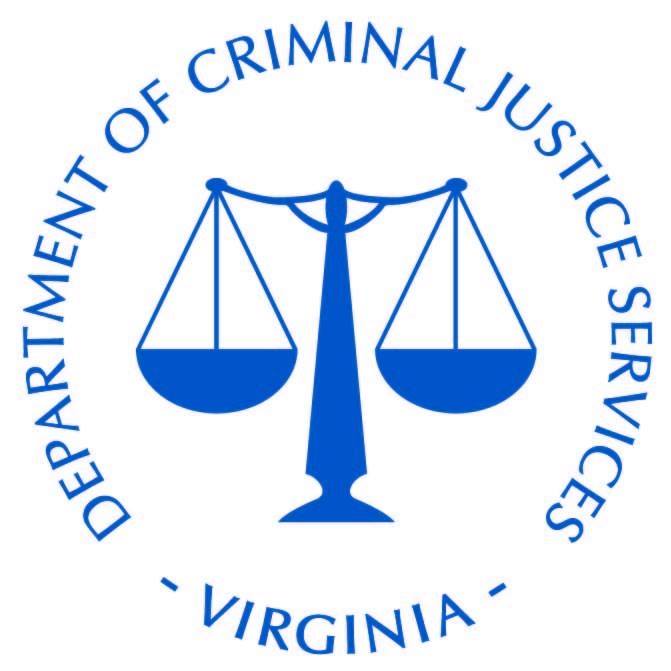| | |  | March is Social Work Month, and the 2023 theme is Social Work Breaks Barriers. This is especially true for our amazing advocates at the disAbility Law Center of Virginia. Here, our social workers commit to spending hours, weeks, and months working with people with disabilities all across the Commonwealth, in order to ensure that they are advocated for and protected. Across several units, including Institutional Rights, Community Resources, Resources and Vocational Access, Litigation, and more, dLCV's social workers go above and beyond to break systemic barriers and empower their clients. It is through this very difficult but meaningful work that dLCV envisions a Commonwealth free of legal barriers for individuals with disabilities. Therefore, we hope you will join us in celebrating some of our most zealous, dedicated, and committed advocates! |
| | Nicole Durose she/her Why did you chose the field of social work? Originally I wanted to be a teacher, and honestly I don't know how I came across social work. I went with social work because I was excited about the focus on social justice and systemic change. Why do you work at dLCV? I like that dLCV focuses on changing the system, but that change is driven by the voices of those in the community who are directly impacted. It's a very person-centered approach and I fully believe in the phrase "Nothing about us without us." Share a fun fact about you I love animals and have a rescued bearded dragon named Snapdragon who enjoys sitting by the window and looking outside. |
|
|
Virginia Pharis she/her Why did you chose the field of social work? I fell in love with the field of sociology when I was an undergrad student at Mary Washington, and I saw social work as the best practical application of sociological principles. Why do you work at dLCV? I was interested in policy and started working on advanced directives as a tool for empowerment and choice, and that led me down the disability rights, rabbit hole, where I have happily stayed ever since. Share a a fun fact about you I am on maternity leave, which means that I can survive the psychological warfare conditions of sleep, deprivation, and continual screaming. Who knew! |
|
|
Taylor Easley she/her Why did you chose the field of social work? Working in the social work field was easy for me because I knew from a young age that I wanted to help and make an impact in communities. I enjoy working as a social worker because I get to use my privilege to fight for the rights of communities and advocate for policies that most people might overlook. Why do you work at dLCV? I work at dLCV because I get to advocate for disability rights in both areas that I love. Working here has given me the knowledge and skills to know that, if I can advocate for disability rights here, I can advocate for disability rights anywhere. Share a fun fact about you I was in the Atlantic Ocean at the beginning of February! |
|
|
| | Rebecca Herbig she/her Why did you chose the field of social work? I have a strong personal interest in social justice and providing holistic, trauma-informed services to people with disabilities. After practicing law for more than 10 years, I returned to school to obtain my Masters in Social Work to learn new skills in working with and supporting client with disabilities throughout their lifespan. Why do you work at dLCV? In her early 20’s, my sister started to experience devastating physical and mental symptoms that were unexplained until nearly 10 years later. Having watched her experiences as a person with multiple disabilities, I became focused on how I could ensure that persons with disabilities have access to excellent healthcare and are treated with dignity and respect. Share a fun fact about you I am a poker fanatic and once played in the World Series of Poker! |
| |
|
Hannah Setzer she/her Why did you chose the field of social work? I chose social work because I knew I wanted to help people (how cliché!) but specifically I knew I wanted to work with the disability community. Why do you work at dLCV? I believe in dLCV’s mission of protection and advocacy as well as ensuring everyone has equal access to human rights and that all places and spaces are accessible. Share a fun fact about you I recently published a memoir about my life as a disabled woman and you can buy it below! |
| | |
|
| | Microaggressions – What Are They and How Do They Cause Harm? A microaggression is an often unintentional, indirect, and subtle form of discrimination against a member of a marginalized community. Microaggressions can be verbal or nonverbal. The term was first used around 1970 by Harvard psychiatrist, Dr. Chester Pierce. He used the term to refer to regular insults and dismissals he witnessed by non-Black individuals against individuals who are Black. But microaggressions can apply to other communities too, including the disability community. Studies have shown that microaggressions can have a major impact on a person’s psychological and physical health. There are three types of microaggressions: (1) microassaults; (2) microinvalidation; and (3) microinsults. Microassaults are intentional insults that are used to hurt the victim. This could include abusive language or jokes at the expense of others. Microinvalidations occur when someone attempts to discredit or minimize the experiences of a person from a marginalized group. Often, this involves the speaker trying to discuss their own experiences as an example, discounting the experience of the marginalized individual. Microinsults are rude, insensitive comments that disrespect a person’s heritage or identity. For example, commenting that you are surprised by how eloquent of a speaker a person of color or a person with a disability is implies that most people of color or people with disabilities are not eloquent. As relates to the disability community, microaggressions are an example of ableism, which assigns inferior worth to people with disabilities, limiting their potential... |
| |
|
| | dLCV's Annual Fundraising Gala: Once Upon a Time Friday, April 14, 2023
6:30 p.m. EST Register now for dLCv's annual spring fundraising gala! Our 2023 Gala theme is “Once Upon a Time.” This theme was chosen with the knowledge that telling our stories and sharing lived experiences always helps break down stigma, in addition to serving as inspiration for others with similar lived experiences. When the clock strikes 6:30, be prepared for a night of storytelling, art, music, & more! |
| |
|
| | We Need Your Help! If you would like to attend our Gala, you can do so for FREE by volunteering 3 hours of support throughout the event process. This can include: - Assisting in set up or take down
- Silent Auction Support
- Pre-Event Decoration
- Registration at Entry
- Greeting
- Photographer
- Live Band Assistance & Support
- Caterer Support
- Post-Event Take Down
If you are interested in helping out in any way for the Gala, please email youssef.guerch@dlcv.org and you will be scheduled! | | | | |
| |
|
| | Do you know a zealous and committed disability rights advocate? In 2023, dLCV will honor an individual whose work has promoted transition and telling one’s own story in the disability community. Think mentors, coaches, and storytellers when contemplating a nominee. Our narratives and real experiences have power when trying to help the larger world understand and empathize with the everyday experiences of people with disabilities. So, nominate someone now for the 2023 Darrel Tillar Mason Excellence in Advocacy Award! |
| | |
|
| |
|
| Do You Know Your Rights? Recently, dLCV partnered with James Madison University to both ensure children and youth with disabilities had access to sexual health information and education and to create an infographic that could be shared widely regarding the rights people with disabilities have when living in licensed provider settings. We believe individuals deserve to know their rights, and who to speak to if these rights have been violated. Check out our infographic on our website, and share with your networks, as we believe education about these rights will help promote the protection and advocacy of Virginians with disabilities. |
| |
|
| | Did you know that dLCV has mental health resources? Getting mental health support can be difficult, especially when working within a fragmented mental health system. That is why dLCV has its very one Protection and Advocacy for Individuals with Mental Illness Advisory (PAIMI) Council. Along with this Council, we also provide several resources, fact sheets, and guides to assist you in advocating for your mental health. Additionally, we have links to complaint processes forms that may be helpful if your rights have been violated. |
| |
|
| | Keep Up with the Legislature A HUGE part of dLCV's advocacy work occurs during the General Assembly. During this time, we keep an eye on all policies that could affect people with disabilities - the good and the bad. We also ensure to keep YOU updated on the latest information, and how it may affect Virginians with disabilities. Throughout this session, dLCV has posted a legislative highlight on our website several times a week. As this general assembly season comes to a close, you can continue to read our legislative highlights to stay informed and learn what changes took place during this legislative session. If you have any feedback or questions, you may email us at GA@dlcv.org. |
| |
|
| | |
|
| Are you someone with a disability who uses Uber or Lyft to travel to work? We want to hear from you! Contact dLCV to share more about your experience. Email: Beth.Klein@dLCV.org
Phone: (804) 225-2042
Video Phone: (804) 215-4723 |
| |
|
| | dLCV is Hiring! Are YOU interested in making a difference for people with disabilities? dLCV currently has a full-time Administrative Assistant position available. The primary function of the position is to assist with purchasing for dLCV and handling travel and training arrangements for staff. The position is the primary agency credit card holder. The preferred candidate will have experience with contracts and contract negotiation. The position will be the back-up for coverage of the receptionist desk and will provide assistance in human resources. |
| |
|
| | |  | Virginia parents, Youngkin administration settle lawsuit over masks and students with disabilities "The commonwealth of Virginia acknowledged in a settlement with parents of 12 students with disabilities that peer masking in K-12 schools is a reasonable modification under the Americans with Disabilities Act and Rehabilitation Act of 1973. The parents of the students are represented by the American Civil Liberties Union of Virginia; the Washington Lawyers’ Committee; the firm of Brown, Goldstein & Levy; the disAbility Law Center of Virginia; and Arnold & Porter..." |
| |
|
 | Guardianships and Alternatives for Survivors With Disabilities "This training, presented by attorney Dana Traynham of the disAbility Law Center of Virginia, will focus on how to recognize possible incapacity when working with people with disabilities. Dana will discuss how to best support and respond to someone with questionable capacity to make decisions about important topics such as safety planning, legal proceedings, and treatment options." |
| |
|
 | Virginia Department of Corrections Denies Equal Services to Visually Impaired People who are Incarcerated "The ACLU of Virginia, the disAbility Law Center of Virginia, and the law firm of Brown, Goldstein, and Levy filed a complaint in the Eastern District of Virginia against the Virginia Department of Corrections (VDOC), individual VDOC officials, and the Virginia Information Technologies Agency on behalf of the National Federation of the Blind of Virginia and seven incarcerated men who are blind or visually impaired and are being denied equal access to services and programs available to sighted incarcerated people." |
| |
|
|
|
| | Contact Us info@dlcv.org | 804-225-2042 |
| |
|
| Stay up to date with our latest news! Don't forget to check out our latest Podcast episodes at dlcv.org/podcast |
| |
|
| |
|
|